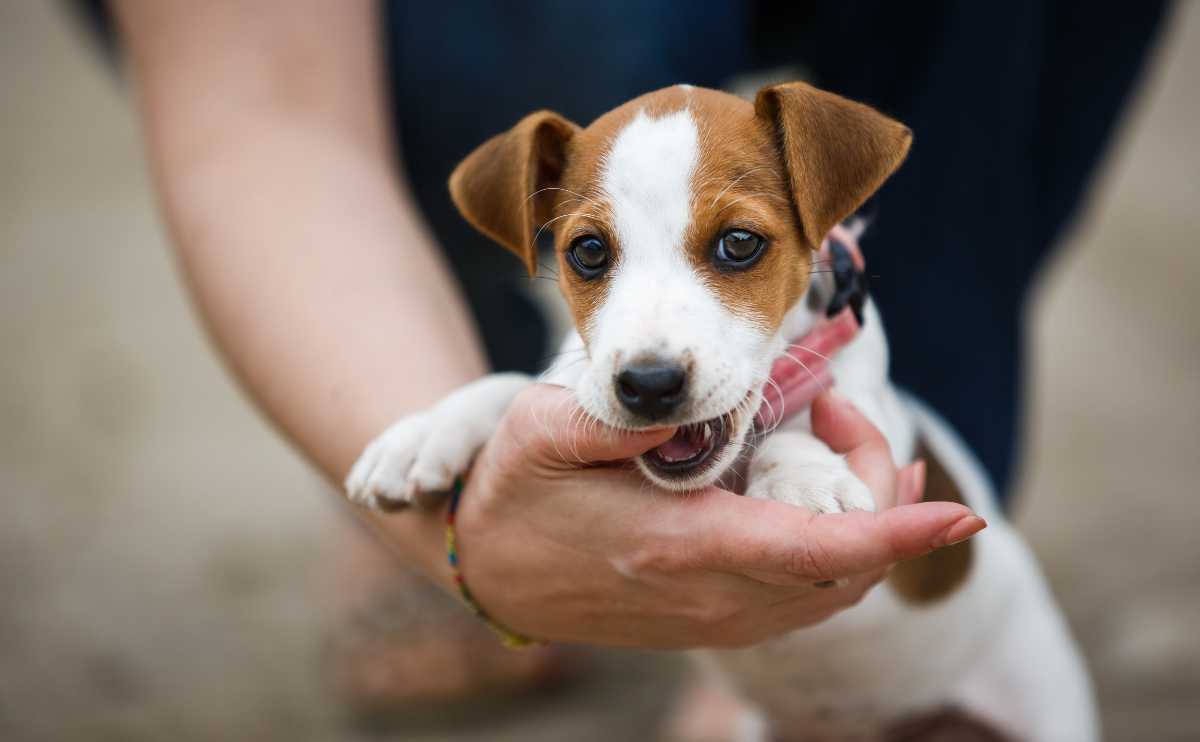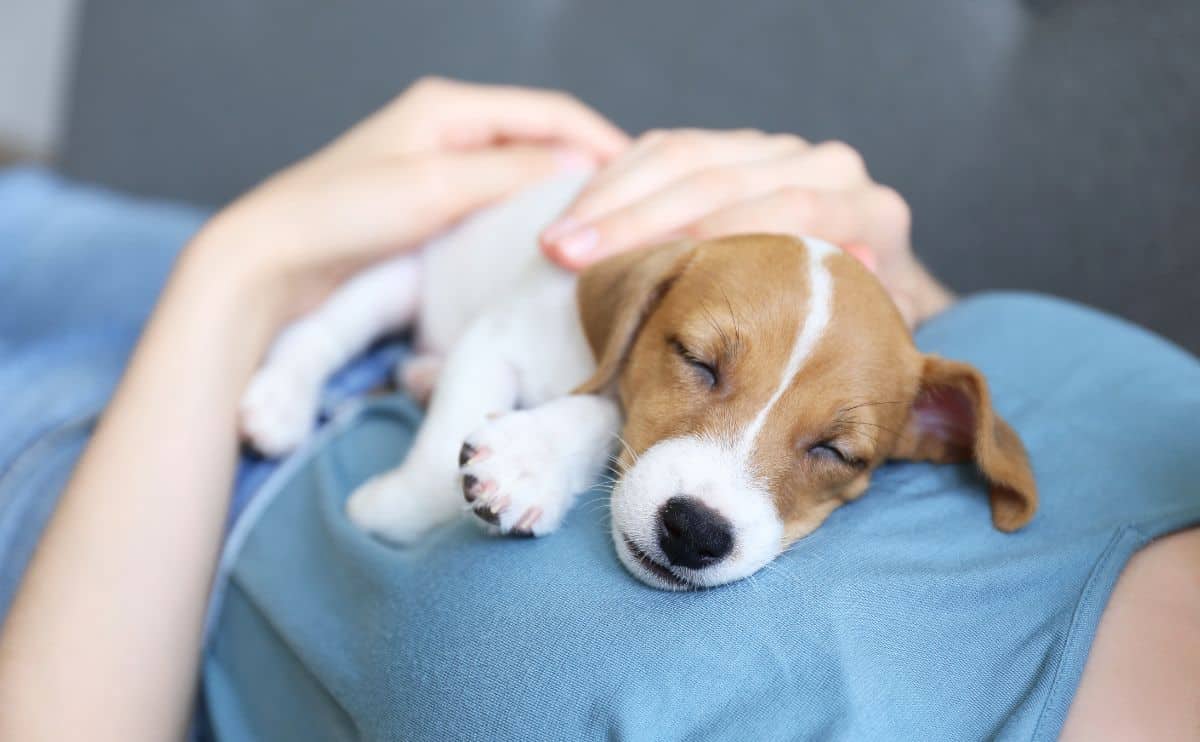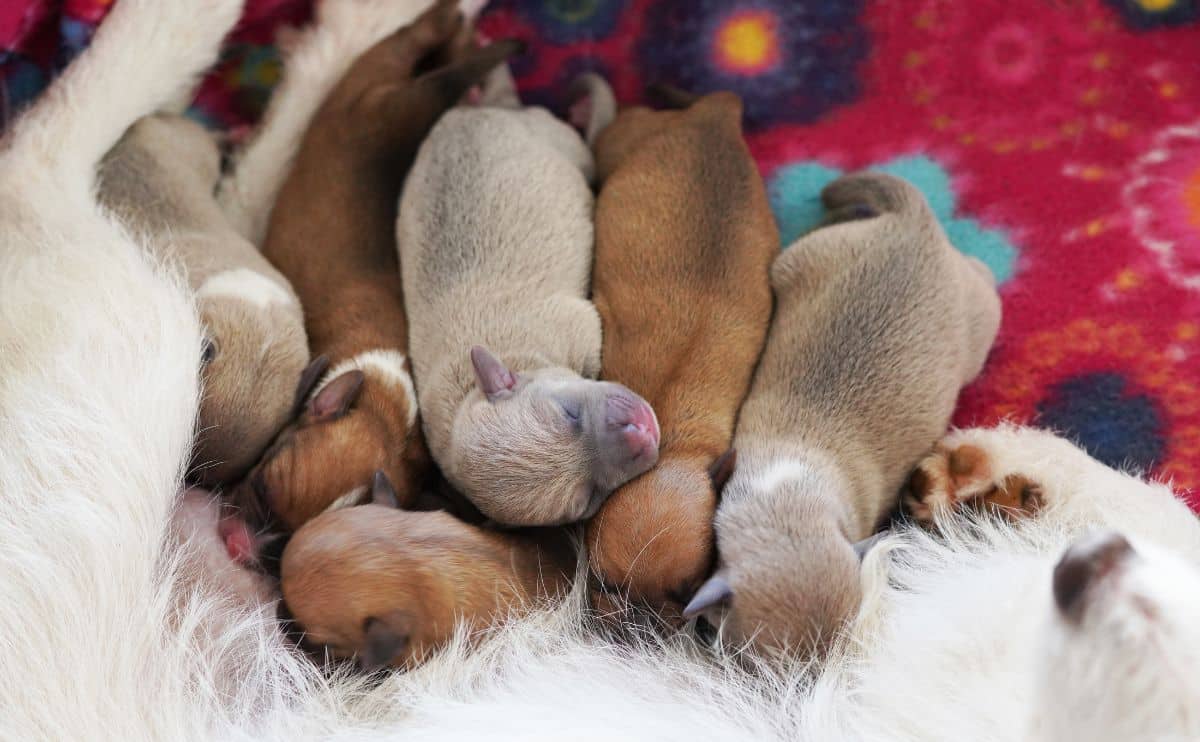When you purchase through links on our site, we may earn a commission. Here’s how it works.

Several “what if” situations and questions may arise shortly after you bring home your new puppy. The good news is most resolutions to these problems are easy with a visit to the vet, a little puppy training, or simply some patience. Here are the answers to some of the most common puppy questions and issues for new pet parents.
- What If My Puppy Behaves Poorly?
- What If My Puppy Bites Me Or Someone Else?
- What If My Puppy Is Breathing Fast?
- Why Puppyhood Is The Best Time To Consider Pet Insurance
- What If My Puppy Is Choking?
- What If My Puppy Has A Cold?
- What If My Puppy Is Constipated?
- What If My Puppy Cries In His Crate?
- What If My Puppy Has Diarrhea?
- What If My Puppy Eats Chocolate?
- What If My Puppy Eats Weed?
- What If My Puppy's Eyes Don't Open?
- What If My Puppy Has Fleas?
- What If My Puppy Has Parvo?
- What If My Puppy Pees In The House?
- What If My Puppy Is Throwing Up?
- What If My Puppy Has Worms?
- What If My Puppy Has Another Illness or Disease?
- What If I'm Late On Puppy Shots?
- What If… My Problem Isn't Listed?
What If My Puppy Behaves Poorly?
Puppy behavior is one of the most common concerns and most frequently asked questions for new puppy owners. Puppies are like children and require education, patience, and stimulation. The best puppy tip for preventing misbehavior is to tire them out. Exhausting a puppy may be as easy as taking him for a couple of short walks and a few games, leaving him to sleep for most of the day.
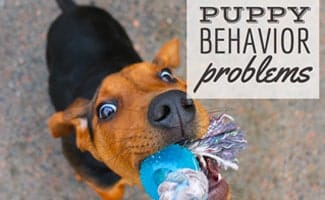
Puppies chew on everything and nip (mild biting) fairly often. This is typical puppy behavior because they’re teething. But it’s important to redirect their behavior before it becomes a problem. We give you specific tips on each of these behaviors below. If you’re worried that these puppy behaviors are an early sign of aggression, that’s usually not the case. In most cases, aggressive behavior is very unusual in puppies.
Read our article on puppy behavior problems and dog training to learn more.
What If My Puppy Bites Me Or Someone Else?
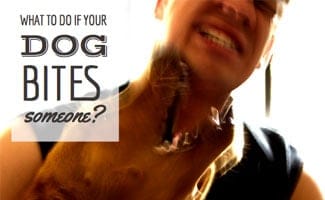
Puppies under six months old are most likely still teething. As their puppy teeth fall out and their adult teeth grow in, there will be pain, and thus they tend to bite more than usual. If they bite you, don’t see it as a sign of them being vicious or mean. They’re simply trying to play with you or help alleviate pain.
So, what do you do if your puppy bites you? Stay calm and don’t attack back. Place a puppy toy in front of him to encourage him to bite on that instead of you. Chew sticks are another good way to keep them occupied instead of channeling their energy on you. If the biting continues past six months, you might consider behavioral training. Learn about what to do if your dog bites someone.
What If My Puppy Is Breathing Fast?
Puppies tend to have a more accelerated breathing rate than adult dogs, anywhere from 15 to 40 breaths per minute compared to around 10 to 30 for adult dogs. If your puppy is breathing excessively, it’s not something to fear. They get overstimulated and thus more excited. Puppies also pant in their sleep or when they’re stressed or scared.
If the rapid breathing happens with other symptoms or seems unusual, it could be an underlying medical issue like Tachypnea, Dyspnea, or early signs of a stroke. Breeds with smaller snouts like Pugs, Boston Terriers, and Bulldogs might also have softer palates and obstructed airways making it difficult to breathe. What do you do if a newborn puppy isn’t breathing? Go to a vet immediately.
Why Puppyhood Is The Best Time To Consider Pet Insurance

As a puppy, your dog has probably not shown any significant health concerns at their young age. Since pet insurance companies do not cover pre-existing conditions, the younger your dog is when you signup, the better coverage you will likely receive throughout their lifetime. Further, pet insurance can help support you financially during the unpredictable puppy years when dogs are more likely to chew on things they shouldn’t and run into dangerous situations. Check out our pet insurance 101 guide to learn more and determine whether pet insurance is worth it for your puppy.
What If My Puppy Is Choking?
Puppies are magnets for eating anything and everything they can get their paws on. If a puppy eats something that gets stuck in his throat, he might start coughing to try and dislodge whatever is obstructing his airway.
First, open up his mouth and stick your finger in to try and swipe out whatever might be lodged in his throat. If you’re unsuccessful, you might try picking up your puppy’s hind legs to help move the item out of his body. If that doesn’t work, the Heimlich Maneuver might help. Watch this video below on how to perform it on a pet. And if all else fails, go to the vet immediately.
What If My Puppy Has A Cold?
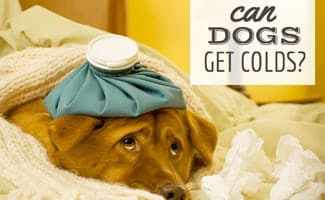
Sneezing, sniffles, and watery eyes all could be signs of a cold in puppies. They also might be more sleepy than usual. If your dog is a young puppy, his immune system may not be up to par, so it’s best to check with your vet if he’s showing cold-like symptoms. Learn more about cold symptoms and treatments for dogs.
What If My Puppy Is Constipated?
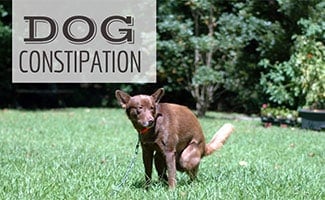
Constipation in puppies is common, just as it is in humans and other animals. In many cases, it’s a mild, temporary irritation for your dog. A change in diet is a common cause, but puppy constipation can indicate a more serious problem.
It’s always a good idea to contact your vet if your puppy hasn’t pooped in more than two days since it could be a sign of a serious condition. Be sure to give your vet information about the last time your puppy had a normal bowel movement, as well as the stool color and consistency. They might recommend a stool softener or another laxative. You might also try mixing a little canned pumpkin into their food. Learn more about dog constipation.
What If My Puppy Cries In His Crate?
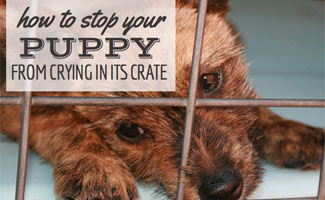
If your puppy doesn’t stop crying when left alone, you’re not alone. Dogs are instinctively denning animals, and they find comfort in having their own pad. But first, puppies need assurance that their new crate is a safe, inviting place. Crate training a puppy can be frustrating, but the earlier you start, the better.
Crying is a natural part of the learning process. It’s not only okay for your puppy to be in his crate alone, but it’s also beneficial for future behavior and temperament — it fosters independence and helps stave off later issues with separation anxiety. If your puppy continues to cry, don’t go to him or pay attention to him. He’ll soon learn that whining will get your attention, and then you’ve got a significant problem on your hands. Learn more tips in our puppies crying in crates article.
What If My Puppy Has Diarrhea?
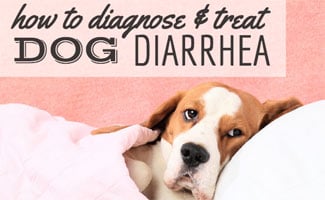
It can often be hard to tell if puppies have diarrhea since pups generally have soft stool. However, if the diarrhea is almost liquid, this is a sign that something is wrong. With puppies, it can be challenging to assess the actual cause of diarrhea because they are very much like human babies: Their system is young enough to have difficulty processing new foods, so any change in diet can cause diarrhea.
With most cases of diarrhea, you should seek medical attention because puppies can get dehydrated quickly. Read more about the causes and treatment options in our dog diarrhea article.
What If My Puppy Eats Chocolate?
Chocolate can be dangerous to puppies. A ten-pound dog can come away with vomiting/diarrhea, hyperactivity, seizures, and an abnormally elevated heart rate from just two ounces of baking chocolate or 20 ounces of milk chocolate. Chocolate also contains fat and caffeine-like substances known as methylxanthines, which can potentially cause the above symptoms and, in severe cases, death.
Depending on how big your pooch is, how much chocolate he eats, and how pure the chocolate is (generally, the purer the chocolate, the greater the risk of toxicity), his symptoms could range from vomiting, diarrhea, fast heart rate, restlessness, and hyperactivity, to increased urination, muscle spasms, and seizures. If you suspect your dog has gotten into chocolate, take him to the vet immediately. Learn which human foods are harmful to dogs.
What If My Puppy Eats Weed?

What happens if a puppy eats marijuana? He will get high. And, if a dog ingests too much, then he could die. Size plays a significant role in how cannabis affects dogs. If two dogs—one 8 years old, 75 pounds, and the other 12 weeks old, 3 pounds—get into the same size stash, the younger puppy will have a worse reaction than the older, larger dog. Some dogs also become more “paranoid” after getting high; this is often shown by them panting and pacing. Learn more about the dangers and side effects of dogs and marijuana.
But, CBD can be safe for your dog. Discover more about how it may help in our dog CBD guide.
What If My Puppy’s Eyes Don’t Open?
A puppy’s eyes should open after 20 days. If they don’t open by then, you should take him to the vet. Do not try and pry them open.
What If My Puppy Has Fleas?

Whether your flea problem begins with a single flea carried by your puppy or with a whole host transferred to your home unknowingly, the result usually results in an infestation. So, getting rid of fleas will take a concerted effort. Fleas may start with one family member, but oftentimes they jump to other family members, so it’s important to act quickly.
If the infestation came from your puppy, you should make a trip to the veterinarian so your pet can have a flea bath to kill the fleas that are currently living off of your pet. Do not bring your pet inside your home until you completely rid your home of fleas, or else he may be infested again. You can avoid this type of infestation by applying a flea and tick preventative to your pet on a regular monthly basis.
What If My Puppy Has Parvo?
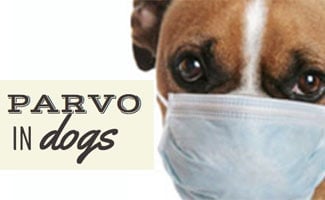
Parvo is a very devastating disease, particularly to young puppies. If your puppy is very young and has not been outdoors, then the chances are that they contracted the disease from the mother. However, if your puppy has been outside, he may have contracted the disease from another dog’s feces.
If you’re confident that your puppy with parvo has not been exposed to the disease elsewhere, it’s essential to notify the puppy’s breeder, the shelter, or the rescue where you obtained the dog. If you haven’t sought medical attention for your dog, this should be your first concern. The sooner you seek medical help, the better chance your puppy will have at combating the disease.
Why is it important to contact the breeder, shelter, or rescue? Parvo is an extremely contagious disease that is also fatal to many young dogs or those with compromised immune systems. You should notify any place your puppy has been around other dogs or where he left fecal traces. More than likely, if your dog contracted parvo from his mother, the breeder will already be aware of the situation and, in most instances, will offer veterinary care. If your breeder was not yet aware, they can then treat their dogs and contact other puppy owners.
What If My Puppy Pees In The House?
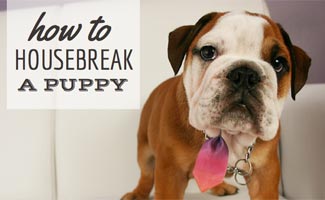
If your puppy has an accident, don’t panic. It happens. Puppies are learning all sorts of new skills as they develop so have patience as they start to build confidence and understand right and wrong behaviors. Dogs younger than 12 weeks haven’t developed bladder or bowel control yet so they’re more prone to potty accidents. Find out how to housebreak your puppy.
What If My Puppy Is Throwing Up?
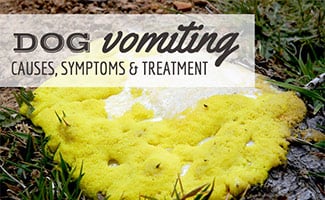
Puppies will eat almost anything under the sun, even if it makes them throw up immediately. Other times, our pups puke for no apparent reason. While occasional vomiting may not be a cause for concern, frequent or severe vomiting can be a sign of a serious condition. You should consult your vet if your dog has an acute or sudden bout of intense vomiting, especially if he doesn’t otherwise vomit occasionally.
Read other symptoms to look out for, what you can do to help your pup, and when it’s time to seek veterinarian care in our dog vomiting article.
What If My Puppy Has Worms?
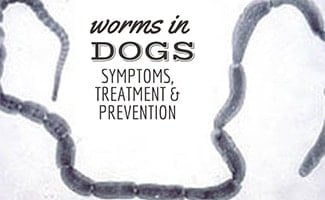
Seeing worms in your new puppy’s stool (or worse, crawling from their bottom) can be very upsetting. In some cases, new puppy owners think that this means their dog is unhealthy and should be given up or traded for another puppy. The fact of the matter is that a considerable percentage of puppies have worms.
Treating worms is an affordable and straightforward process that any veterinarian can take care of quickly. A puppy with worms is not unusual, and it does not mean that your new puppy is very sick; it simply means that they need to be de-wormed.
What If My Puppy Has Another Illness or Disease?
One of the biggest concerns that new puppy owners have is that the pup will contract a terrible illness or incurable disease. The good news is that this isn’t common.
If your puppy has an illness or disease, you should always consult your veterinarian to ensure his welfare.
Be sure to notify the puppy’s previous caretakers, as in the parvo example noted above. If a disease passed from a mother to the puppy, it is critical to let the breeder know to treat the mother. For things like hip dysplasia, they should be aware, so they can decide on whether to breed her again in the future.
In some instances, the breeder may offer to pay towards the medical treatment or offer to exchange the puppy for one from another litter. It may seem unthinkable to “exchange” a beloved family member, but in some instances where the dog was to have a job that would be impeded by their illness, exchanging the dog for another is a valid option.
What If I’m Late On Puppy Shots?
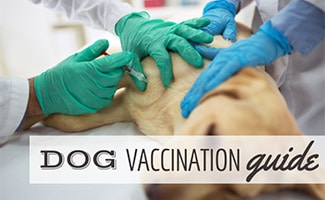
Like babies, puppies have a rigid vaccination schedule. Since their bodies are young and developing, it’s important to get them vaccinated from diseases from a young age to help them build up immunity. Puppies up to 16 weeks are somewhat immune due to passive immunity passed down through the mother’s placenta. However, it’s recommended that you begin vaccinating a puppy from around four to six weeks of age until 16 weeks. Then your puppy should get booster shots every two to four weeks.
If you miss any vaccinations during this schedule, there’s some flexibility to an extent. If it’s only a lapse of a week or two of their due date, then there shouldn’t be any concerns. However, if it’s longer than a few weeks, you should speak to your vet about a new vaccination course of action to make sure your puppy is protected. See which shots are recommended and when in our dog vaccination guide.
What If… My Problem Isn’t Listed?
For most new puppy owners, there will be bumps along the road, but they’ll be small, and you’ll be able to overcome them with patience, training, and a good veterinarian.
If you happen to be one of the few who experience the larger bumps, know that you can tackle them with the help of a knowledgeable veterinarian or dog trainer.
Tagged With: